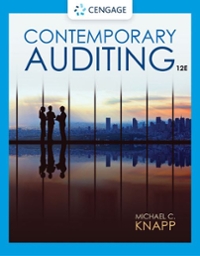After spending much of the previous three months working elbow-to-elbow with as many as six colleagues in
Question:
After spending much of the previous three months working elbow-to-elbow with as many as six colleagues in a cramped and poorly ventilated conference room, Hamilton Wong was looking forward to moving on to his next assignment.1 Wong served as an in-charge accountant on the audit staff of a large international firm's San Francisco practice office, the same firm that had offered him a job two years earlier as he neared completion of his accounting degree at San Jose State University.
His current client, Wille & Lomax, Inc., a public company and the second-largest client of Wong's office, owned a chain of retail stores in the western United States that stretched from Seattle to San Diego and as far east as Denver and Albuquerque.
Although Wille & Lomax's stores operated under different names in different cities, each stocked the same general types of merchandise, including briefcases and other leather goods, luggage and travel accessories, and a wide range of gift items, such as costume jewelry imported from Pacific Rim countries. The company also had a wholesale division that marketed similar merchandise to specialty retailers throughout the United States. The wholesale division accounted for approximately 60 percent of the company's annual sales.
A nondescript building in downtown San Francisco, just one block from bustling Market Street, served as Wille & Lomax's corporate headquarters. The company's fiscal year-end fell on the final Saturday of January. With the end of March just a few days away, Hamilton and his fellow "Willies"-the nickname that his office assigned to members of the Wille & Lomax audit engagement team-were quickly running out of time to complete the audit. Wong was well aware that the audit was behind schedule because he collected, coded, and input into an electronic spreadsheet the time worked each week by the individual Willies. He used the spreadsheet package to generate a weekly time and progress report that he submitted to Angela Sun, the senior who supervised the fieldwork on the Wille & Lomax audit.
In addition to Wong and Sun, another in-charge accountant, Lauren Hutchison, and four staff accountants had worked on the Wille & Lomax audit since early January. Wong and Hutchison knew each other well. They shared the same start date with their employer, and the past two summers had attended the same weeklong staff and in-charge training sessions at their firm's national education headquarters.
Hutchison's primary responsibility on the current year's audit was the receivables account, but she also audited the PP&E (property, plant, and equipment) and leases accounts. Besides his administrative responsibilities, which included serving as the engagement timekeeper and maintaining the correspondence file for the audit, Wong supervised and coordinated the audit procedures for inventory, accounts payable, and a few smaller accounts.
Hamilton was thankful that it was late Friday afternoon. In recent weeks, with the audit deadline looming, Angela Sun had required the Wille & Lomax crew to work until at least 7 p.m. each weekday except Friday, when she allowed them to leave "early" at 5 p.m. The engagement team had spent three consecutive Saturdays in the client's headquarters and would be spending both Saturday and Sunday of the coming weekend hunched over their workpapers. Wong had just completed collecting and coding the hours worked during the current week by the other members of the engagement team. Now it was time for him to enter in the electronic spreadsheet his chargeable hours, which he dutifully recorded at the end of each workday in his little "black book."
Questions
1. Place yourself in Hamilton Wong’s position. Would you report all of your time worked on the Wille & Lomax audit? Why or why not? Do you believe that Lauren Hutchison behaved unethically by underreporting the time she worked on that engagement? Defend your answer.
2. Academic research suggests that underreporting time on audit engagements is a common practice. What are the key objectives of tracking hours worked by individual accounts or assignments on audit engagements? What implications does the underreporting of time have for individual auditors, their colleagues, and the overall quality of independent audits?
3. What measures can accounting firms take to ensure that time budgets do not interfere with the successful completion of an audit or become dysfunctional in other ways?
4. What measures can accounting firms take to reduce the likelihood that personal rivalries among auditors of the same rank will become dysfunctional?
Step by Step Answer:






